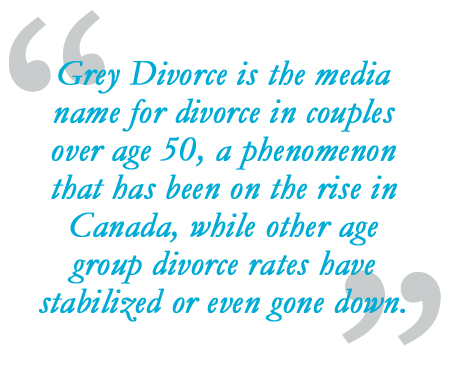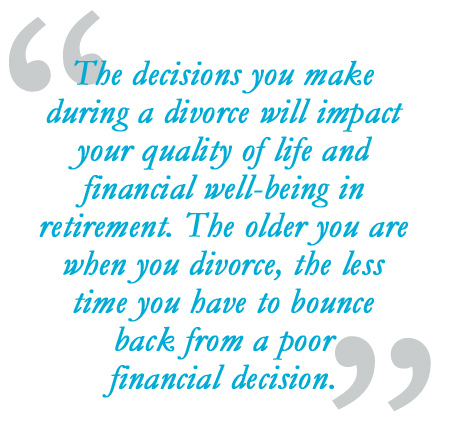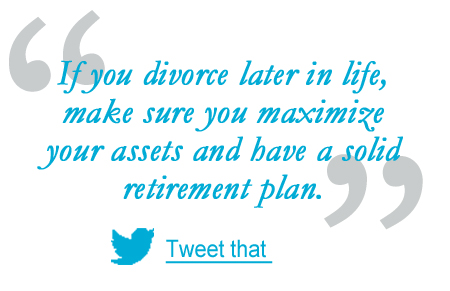By Annie Kvick, B.Ed, CFP®
 The ending of a marriage is an unfortunate reality for many Canadians, it creates emotional upheaval for both partners and any children involved. But studies have shown that it generally impacts a woman’s financial well-being longer and more significantly than it does a man’s. This imbalance can have serious consequences for women approaching retirement.
The ending of a marriage is an unfortunate reality for many Canadians, it creates emotional upheaval for both partners and any children involved. But studies have shown that it generally impacts a woman’s financial well-being longer and more significantly than it does a man’s. This imbalance can have serious consequences for women approaching retirement.
Today is International Women’s Day, and this year’s theme is #BeBoldForChange. Organizers want us all to take bold action in our spheres of influence, toward gender parity. An important initiative; but I believe that it is equally important for women to take bold action within their own lives—to be financially secure and confident, ready for whatever life circumstances unfold.
Canadian women of all ages have made strides towards financial independence, but there is still more to do. Many baby boomer women have had to shake-off the childhood message, that finances are a man’s responsibility—old school thinking that leaves women more financially vulnerable after a breakup.
Here is what you need to know to protect your financial future from divorce.
Grey Divorce on the Rise
Grey Divorce is the media name for divorce in couples over age 50, a phenomenon that has been on the rise in Canada, while other age group divorce rates have stabilized or even gone down. Longer lifespans and better health in later years are considered contributing factors for couples deciding to make fresh starts after long marriages. Tipper and Al Gore  who divorced in 2010, at ages 61 and 62 after 40 years together, are a well-known example.
who divorced in 2010, at ages 61 and 62 after 40 years together, are a well-known example.
But as a Money Coach I’m more concerned with the financial fallout, than the sociological causes. In Canada, assets and liabilities are generally divided 50/50, but longer life expectancies for women can mean less than equitable retirement lifestyles. And there are other realities throughout a women’s lifetime that can come back and impact her financial circumstances after a divorce. Let me explain.
The Financial Toll of Divorce on Women
Divorce at any age impacts the finances of both partners. Joint income that once supported one household now has to support two, plus a contentious divorce can rack up a lot of expenses for court and legal fees. But women face a unique set of circumstances that can affect their long-term financial health.
- Lower earnings: According to a report on the Canadian Women’s Foundation website, in 2014, full-time women workers earned an average of 74 cents for every dollar earned by men. Not only does this affect how much money women are able to save, it affects how much they are eligible to receive in CPP benefits. This disparity affects women regardless of marital status, but those who made retirement plans in conjunction with a partner, only to have that situation change as they are reaching the end of their career, will feel the impact more significantly.
- Life expectancy: A woman turning 65 in 2017 can expect to live to 86.6 years old, almost three years longer than the expectation for a man turning 65 this year. Three years may not sound like a lot, but in terms of needing care in later years, the extra income required could be substantial.
- Insufficient savings: Less money earned means less money saved, but women may also fall victim to a nurturing nature. It isn’t uncommon for women to place an emphasis on saving for their children’s education to the detriment of their own future, especially if they expect to share retirement expenses with a spouse. If an unexpected divorce happens in later years, they may end up relying on the children they intended to help.
- Diminished Earning Potential: Stepping away from the job market for an extended period, to care for their children, is an honourable choice made by many women. But it does come with an economic price tag. There are the lost wages, the lost savings, and the lost CPP contributions. If and when a woman decides to return to work, she is often required to re-establish the momentum she was building before her departure, and may find that she is earning less than her peers who didn’t leave.
- Less Financial Literacy: Division of responsibilities is common in most marriages, and more often than not men take the lead in family finance. This isn’t necessarily a problem, if there is regular communication, and both partners understand and have a voice in the family finances. But a woman who loses touch with how her money is managed and invested can find she’s financially vulnerable and overwhelmed if her marriage breaks down.
Alimony, which used to be standard practice after divorce, has shifted and changed significantly in Canada and the United States over the years, and may not provide the support and security in retirement that it once did. An American study of over 55,000 divorced women, by economists Claudia Olivetti and Dana Rotz, revealed that women who divorced after age 50 were 10% more likely to still be working full time until age 74, than women who divorced before they turned 30 years old.
With so many variables affecting women’s financial futures, it’s paramount that they have the best advice possible.
 Get Professional Advice
Get Professional Advice
The decisions you make during a divorce will impact your quality of life and financial well-being in retirement. The older you are when you divorce, the less time you have to bounce back from a poor financial decision. This is not a time to let fear, anger or sadness take over from reason, and the best way to avoid that is professional help. Here are some of the options to consider in addition to your lawyer:
Financial Planner
Your lawyer will be able to help you navigate some of the financial issues you’ll face, but a lawyer is not a financial professional. The 50/50 split of assets does not mean that every asset is cut in half. It’s a negotiation of assets intended to be equitable for both parties. What is crucial to understand is that what appears equitable on paper today, may play out very differently in the long term financially. It is important that you discuss the proposed division of assets with a financial planner—preferably one who specializes in the needs of divorced women—who can evaluate the tax implications and other long term benefits or pitfalls. You want your divorce settlement to work for you, and you need to minimize your tax exposure.
Certified Divorce Financial Analyst
Another option is a certified divorce financial analyst. These professionals are often referred to as pre-divorce financial planners. They work with couples who are willing to sit down together before lawyers are involved, to develop a plan that serves both partners fairly. Each person will have different cash flow needs and expenses long-term. Certified divorce financial analysts have expertise with retirement assets and pensions, tax issues, valuing and dividing property, support agreements and more. Working with this sort of professional can eliminate unfortunate and costly tax scenarios down the road.
Divorce is an ending, but it is also a beginning. If you are returning to the workforce or looking to maximize you earning potential, you may consider working with a vocational expert. They can help you match your education, qualifications and experience to the employment market. Their evaluation of your potential earning power can also be submitted to the court to assist in the determination of possible support payments.
Get Proactive
On International Women’s Day and beyond, we can advance gender parity in our own marriages by making sure that we participate in decisions around our own financial future. Opting to leave our finances in a partner’s care can leave us exposed to severe financial issues in the case of illness, death and above all, divorce.
If you have divorced, especially later in life, consult a financial professional to make certain you are maximizing your assets and have a retirement plan that will serve your needs.
We hope this article has been helpful and provided some practical advice on how you can improve your financial well-being. If you need additional support, please contact one of our Money Coaches today.



